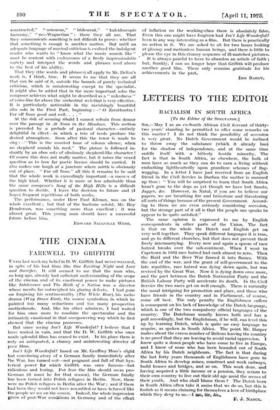THE CINEMA
FAREWELL TO GRIFFITH
UNTIL last week my belief in D. W. Griffith had never wavered, in spite of his bad films like One Exciting Night and Love and Sacrifice. It still seemed to me that the man who, so long ago, already had sufficient understanding of the scope of the cinema and of its emotional power to make pictures like Intolerance and The Birth of a Nation was a director whose merits far outweighed his glaring defects. I had gone on forgiving his sentimentality (The White Rose), his melo- drama (Way Down East), the coarse symbolism in which he painted too many seductions and too many prospective motherhoods. And, like his other admirers, I had waited for him once more to combine the spectacular and the intimately emotional in that overpowering way which he first showed that the cinema possesses.
But since seeing Isn't Life Wonderful? I believe that I have waited in vain, and that the D. W. Griffith who once made splendid films has ceased to exist. In his place there is only an antiquated, a clumsy and uninteresting director of poor films.
Isn't Life Wonderful? based on Mr. Geoffrey Moss's slight but convincing htory of a German family immediately after the War, has turned out—not poignant and full of that hys- terical power for which Griffith was once famous—but ridiculous and boring. For fear the film should seem pro- German (it must be for that reason), the German family has been turned into Polish refugees in Berlin. Now, there were no Polish refugees in Berlin after the War ; and if there bad been they would not have resembled or have behaved like the people we see on the screen. Indeed, the whole impression given of post-War conditions in Germany and of the effect of inflation on the working-class there is absolutely false. Even this one might have forgiven had Isn't Life Wonderful? been in any way interesting as a film. But there is practically no action in it. We are asked to sit for two hours looking at gloomy and motionless human beings, and there is little to please the eye in this clumsy sequence of ill-matched pictures.
It is always painful to have to abandon an article of faith ; but, frankly, I can no longer hope that Griffith will produce another good film. There only remains gratitude for his achievements in the past.
IRIS BARRY.










































 Previous page
Previous page